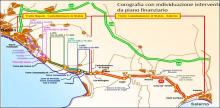SIS, a subsidiary of Spanish contractor Sacyr, has won a €2.8 billion contract to build and operate the 186km Roma-Latina motorway in Italy.
Autostrade Del Lazio, a public company created to build and manage the motorway, awarded the public private partnership contract, officially called Corridoio intermodale Roma-Latina e collegamento Cisterna-Valmontone.
The SIS Scpa consortium, which consists of Sacyr (49%) and Fininc di Torino (51%), will build-operate-maintain the highway over 50 years. Revenue i
SIS, a subsidiary of Spanish contractor 3959 Sacyr, has won a €2.8 billion contract to build and operate the 186km Roma-Latina motorway in Italy.
Autostrade Del Lazio, a public company created to build and manage the motorway, awarded the public private partnership contract, officially called Corridoio intermodale Roma-Latina e collegamento Cisterna-Valmontone.
The SIS Scpa consortium, which consists of Sacyr (49%) and Fininc di Torino (51%), will build-operate-maintain the highway over 50 years. Revenue is likely to be around €12.25 billion.
SIS was in competition with7809 Salini Impregilo for the project that will include 78 viaducts, two tunnels, 17 junctions and three tolling areas. Around 32,000 vehicles are expected to use the motorway daily.
Sacyr Concesiones is already operating the 145km Pedemontana-Veneta motorway now under construction and which will need an investment of €2.5 billion, according to a report in the Spanish newspaper Cinco Dias.
Autostrade Del Lazio, a public company created to build and manage the motorway, awarded the public private partnership contract, officially called Corridoio intermodale Roma-Latina e collegamento Cisterna-Valmontone.
The SIS Scpa consortium, which consists of Sacyr (49%) and Fininc di Torino (51%), will build-operate-maintain the highway over 50 years. Revenue is likely to be around €12.25 billion.
SIS was in competition with
Sacyr Concesiones is already operating the 145km Pedemontana-Veneta motorway now under construction and which will need an investment of €2.5 billion, according to a report in the Spanish newspaper Cinco Dias.







